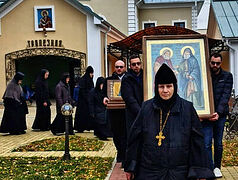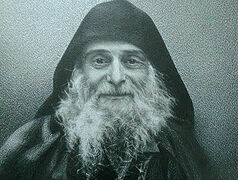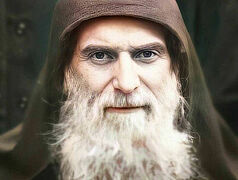February 22, a feast-day of the Venerable Confessor Gabriel (Urgebadze), we offer readers the reminiscences of five abbesses of Georgian convents who went through “Elder Gabriel’s school”
“He saw the image of God in every person”
Abbess Ketevan (Kopaliani):
 St. Gabriel (Urgebadze) The Venerable Gabriel possessed special grace. He saw the image of God in every person and did not single out anyone. He always sympathized with the weak and was surprisingly meek, regarding himself as the worst sinner and calling us to humility. He often instructed: “For God, all sins are like pebbles. There is no sin in the world that would surpass the mercy of the Lord.”
St. Gabriel (Urgebadze) The Venerable Gabriel possessed special grace. He saw the image of God in every person and did not single out anyone. He always sympathized with the weak and was surprisingly meek, regarding himself as the worst sinner and calling us to humility. He often instructed: “For God, all sins are like pebbles. There is no sin in the world that would surpass the mercy of the Lord.”
Once, when I was a ryassophore nun, Fr. Gabriel closed the doors of the refectory, keeping the nuns inside, and ordered me to bring a basin and wash everyone’s hands. After fulfilling his blessing, I approached him, holding a basin of dirty water in my hands. The elder looked at me searchingly and suggested that I drink this water. I asked in confusion: “Should I drink up all the water?” “Yes, to the bottom!” he answered in Russian. There was no time to think, so I had to drink. He hugged me, blessed me and said: “You will come in handy as an abbess.”
There was not a moment when Fr. Gabriel did not think about God. He always instructed us to read prayers with awe and reverence. Sometimes he mimicked us: “Tra-ta-ta-ta, ra-ta-ta-ta! Are you praying, cursing or reading a newspaper?! You’re like a Chapaev machine gun! Think about Who you are praying to, Who you are talking to. The Lord is always invisibly with us.”
Batiushka did not accept people’s praise. In such cases he began to feign foolishness, making people stop talking. And when someone came to him humbly for advice, he instructed him with Biblical wisdom. If a person’s faith needed to be strengthened, Fr. Gabriel would start talking about the miracles that had happened to him.
Once we were visiting the small church built by batiushka himself. He told us:
“The roof was leaking, and I was grieving—what would happen to these icons? Several cubic meters of building material were required for repair, but there were no funds. I was very worried and prayed to God for help. Suddenly a stranger appeared, who turned out to be an engineer. He looked at the icons and then said in surprise: ‘Strange enough, I was in a hurry, but some power has made me come here. Do you know what the icon is asking me now? To donate a few cubic meters of wood for the elder.’”
The elder showed him the icon of the Savior, in front of which he himself used to pray to God for help. Overjoyed, the layman promised him to donate everything needed and kept his word.
One day His Holiness Catholicos-Patriarch Ilia II came to Samtavro Convent. At that time Fr. Gabriel came out of his tower (where he lived) with a diadem on his head. After they had exchanged blessings, the Patriarch wondered: “Father Gabriel, is your diadem golden?” “No, Your Holiness. If it were golden, my head would have been cut off,” the elder replied jokingly.
“The intellectuals have arrived! Go and make some soup quickly!”
Abbess Mariam (Mikeladze):
I first saw him at Sioni Cathedral of Tbilisi. Before he even entered the church he started screaming. At that time I considered myself a “very religious person”. I had my own opinion about everything, and therefore I took him for a madman and believed him to be in delusion.
However, his eyes, full of love and sorrow, prevented me from asserting such a verdict. They contradicted his outward anger.
The next meeting with Fr. Gabriel took place at Samtavro. And here I saw the same contrast between his eyes and his behavior. By that time, I had almost decided to take up monastic life, and my idea of monasticism was limited to the Lives of several saints. This was the period when Fr. Gabriel had already become an ascetic at Samtavro. The most important thing he did for me was to destroy my bookish idea of monasticism, which created a sense of special spiritual comfort. Sometimes, when I would retire to my room and begin to turn to God in my mind, his loud voice was suddenly heard out of thin air: “The intellectuals have arrived! Go and make some soup quickly!” This annoyed me a lot.
My father was against my life at the convent, and almost every day he would come to make me change my mind. One day I was called again and told that my father was waiting for me at the church. I went inside and what scene did I see there? Elder Gabriel was standing in an theatrically expressive pose, while my father was kneeling in front of him. Then the elder asked my father to invite him to a restaurant. They passed by without paying any attention to me at all. Then it turned out that Fr. Gabriel sang at the restaurant, and with this singing he won my father’s heart forever. So they became friends, and I stopped worrying.
Unfortunately, we were unable to understand him and appreciate him—we were not ready for such a miracle. He was a genuinely great ascetic who dedicated his only life, given by God, to the Lord.
“His secret communication with invisible powers sometimes scared me”
Abbess Theodora (Makhviladze):
We observed his unusual behavior. Once we went together to the Holy Trinity Cathedral of Tbilisi. At the entrance he began to beg and then gave me all the money he had received. There were my friends among the parishioners. From their surprised faces I realized how strange I looked, but next to Fr. Gabriel nothing worried me. I often saw the elder very serious—this happened mainly in the small church built by him in Tbilisi, where he spent time in seclusion during fasts and did not let anyone in. But even there we did not give him rest—we visited him, and he received everyone without exception in his cell full of icons. For some reason Fr. Gabriel was always thoughtful and reticent there. He would withdraw into himself there, never joking or feigning foolishness, but discussing serious spiritual questions with us. “I have realized my weakness,” he often repeated, and these words contained a deep meaning. I felt that they came from ascetic experience. By his side I lost the sense of time and could not understand whether our conversation lasted for hours or minutes.
Time went by, and I was more and more convinced that the elder’s words and actions, no matter how strange they might seem, were a reflection of his sincere faith and sacrificial love for God and neighbor. He devoted his entire life to the fulfillment of these two commandments. The elder did not leave anyone who came to him humiliated or insulted without consolation regardless of their moral qualities, beliefs and nationality. His anger did not cause despair; but, rather it awakened us from coldness and indifference. At night a voice could often be heard from his cell—now shouting, now quarreling with someone, and now in some dialogue; but we knew that he was alone there. His secret night-time communication with the invisible powers sometimes scared me. Personally, I never doubted that Fr. Gabriel had his own, special perception of the world.
“Come on, I must calm them down”
Abbess Elizaveta (Zedgenidze):
One Saturday he said: “Let’s go to take Jvari Monastery1!” I was already used to his feigned foolishness. He blessed me to buy a bottle of vodka, hid it under his mantle, and with a serious air walked towards the monastery. He suddenly turned to me, opened the bottle, took a sip and invited me to do the same. I took a sip (and thought it was water). He asked everyone he met to do the same and then said with a satisfied air: “Look, no one has condemned me! They will all enter the Kingdom of Heaven.” I hoped the show would end there, but alas! Fr. Gabriel gazed at me seriously and said: “Sit down, stretch out your hand and beg!”
Within an hour bread and other food were given to us, and batiushka invited all those present to a meal, but he himself did not touch the food. He concluded the unusual meal with the words: “Let him who humbles himself be exalted.”
When almost daily protest rallies were raging in Georgia, he once suddenly said:
“Come, I must calm them down.” He made his way through the crowd of women, gave a sermon—and after his words all negative emotions went away.
“Elder Gabriel’s entire life was preaching the Gospel”
Abbess Parasceva (Pachuashvili):
Elder Gabriel had his own, as it were, favorite expressions. For example, during conversations he used to say, “In the name of Christ...” He pronounced the name of Christ so expressively and clearly that one could feel his selfless love for the Lord. While humbling someone, he always added the following phrase: “What are we like?!”
Once, when we were in the courtyard of Samtavro Convent, Elder Gabriel asked a sister to bring him a candle. This sister was so slow that we called her “Nelichka”. “Neli” means “slow” in Georgian. So, she left and disappeared. When she finally returned, Elder Gabriel took the candle from her and jokingly told her: “If you were a priest, how quickly would you administer Communion?...”
After the repose of Patriarch Pimen of Moscow and All Russia, guests from Russia came to Samtavro Convent—a priest and two nuns. Elder Gabriel welcomed them cordially, and when he learned about the Patriarch’s repose, he fell on his knees, weeping and banging his forehead on the floor with all his might:
“Pimen is dead—why am I alive?!” batiushka wailed in a high voice.
Then we believed that he was play-acting, but now we understand that these were his sincere troubles and words coming from his loving heart.
He used to say: “If you see your neighbor in sin, don’t condemn him...” Batiushka often warned us that judging is a terrible sin, and in no case should anyone condemn his neighbor. And now, in our days, Elder Gabriel teaches us and preaches to us with his whole life about why we must not judge anyone. In batiushka’s lifetime we condemned him... Both in word and in our hearts we judged a chosen one of God, a great saint. After all, Elder Gabriel’s entire life was preaching the Gospel. It was preaching both in word and for the most part in deed. And yet, in addition to many other virtues, it can be said that above all Elder Gabriel taught us the following in his life: Do not judge!
Appeal to readers
Dear brothers and sisters!
With the blessing of His Holiness Catholicos-Patriarch Ilia II of All Georgia, since 2019 we have been working on a new film about our beloved Saint Gabriel (Urgebadze), Mama Gabrieli.
We appeal to all of you with a request to make a contribution to the continuation of the shooting of the film.
Sberbank card number: 4276 6900 1646 4429
Recipient: David Kobaevich Chikadze (Давид Кобаевич Чикадзе)
Paypal: diademas@yahoo.com
When donating funds, please indicate your names in Holy Baptism, and also the names of your departed relatives. For all donors a prayer service will be celebrated at the relics of St. Gabriel (Urgebadze) at Samtavro Convent. Besides, all your names will be remembered at the wonderworking icon of Sts. Gabriel and Seraphim of Sarov.
You can also send your names in an email to diademas@yahoo.com



